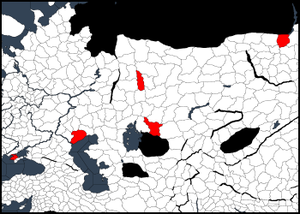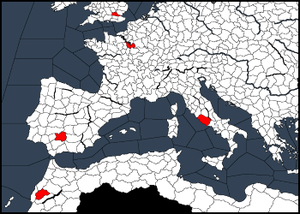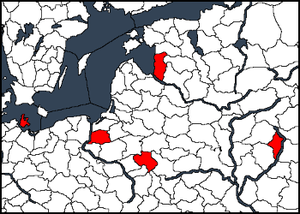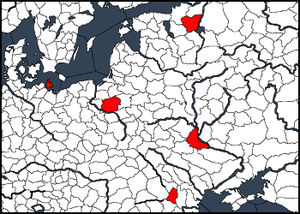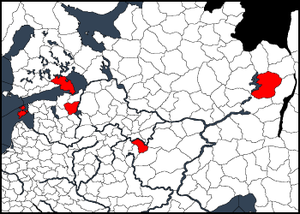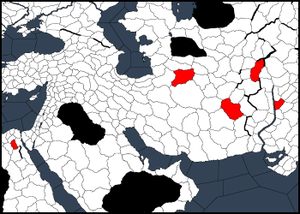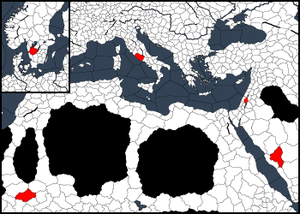![]() 原始宗教(英文:Pagans)遵循着古老的多神教传统,摒弃亚伯拉罕和印度宗教关于物质与精神领域相互隔离的观点,而是支持多神论的自然神灵。
原始宗教(英文:Pagans)遵循着古老的多神教传统,摒弃亚伯拉罕和印度宗教关于物质与精神领域相互隔离的观点,而是支持多神论的自然神灵。
Paganism normally requires the ![]() Old Gods or
Old Gods or ![]() Holy Fury DLC to be playable. Bön is also unlocked by
Holy Fury DLC to be playable. Bön is also unlocked by ![]() Jade Dragon, and
Jade Dragon, and ![]() Horse Lords allows playing pagan nomadic rulers. Without
Horse Lords allows playing pagan nomadic rulers. Without ![]() Holy Fury, Hellenic paganism requires the use of exploits or the Ruler Designer to play.
Holy Fury, Hellenic paganism requires the use of exploits or the Ruler Designer to play.
Historically, the pagan faiths were gradually supplanted by Christianity, Islam, and the Dharmic religions, but this does not necessarily happen in the game. Pagans may fight back in the name of the old gods, and even seek to eliminate the monotheists from Europe.
In game terms, all pagan religions fall into one of two broad groups, with a few exceptions - the offensively-oriented Germanic, ![]() Hellenic (Greco-Roman), Tengri and
Hellenic (Greco-Roman), Tengri and ![]() Aztec faiths, and the defensively-oriented Romuva (Baltic), Slavic, Suomenusko (Finnic), West African, and Bön (Tibetan). The Zunist are unique in the fact that they are something of a hybrid of the Offensive and Defensive and the generic Paganism grants no bonuses.
Aztec faiths, and the defensively-oriented Romuva (Baltic), Slavic, Suomenusko (Finnic), West African, and Bön (Tibetan). The Zunist are unique in the fact that they are something of a hybrid of the Offensive and Defensive and the generic Paganism grants no bonuses.
早期强势,后期乏力
Playing as a Pagan non-nomad offers a highly offensive, rapidly changing play-style. However, stability is very low, and you have little control over your realm. It also supports early-game dominance - you are next-to-none as a Germanic ruler in 867. However, the longer the faith goes unreformed, the weaker it becomes. Pagans tend to be powerful in early years but weaken as time passes for several reasons:
- Powerful Pagan CBs allow Pagans to expand quickly. Large realms, however, are unstable due to elective gavelkind (if tribal), difficulty converting characters and provinces, higher priority for independence factions, and a large Short Reign penalty.
- The ability to raid makes some pagans uniquely wealthy in the early game. Germanic pagans do especially well since they get free ships, can navigate rivers, and are close to prime raiding targets. But later, feudal realms grow their income more quickly, while raiding becomes less feasible as targets consolidate. Feudal rulers bordering rivers will eventually increase their fort level to the point that Germanic pagans can no longer navigate those rivers.
- Defensive attrition is a powerful deterrent in the early game. However, it only applies to the homeland, and pagans have difficulty converting provinces due to low moral authority. Defensive attrition is completely negated once attackers reach Military Organization 4.
- Pagans find it difficult to switch from tribalism unless they start as feudal (Balkan states and Zunists). Tribal holdings can be upgraded quickly, but fully settled provinces can be upgraded more. Medium-sized tribal realms can muster unusually large armies by having a large demesne, and by calling vassals to war rather than raising levies. Large tribal realms do not benefit as much since vassals of vassals cannot be called.
- Pagan territories are usually significantly technologically behind all other culture's territories, with the exception of the Germanic having a tremendous lead in shipbuilding at the start of 867, as well as receiving said bonus after some time at the 769 start.
- Foreign missionaries become more effective as tribal rulers decide they are ready to feudalize.
There is hope, however: should the Pagan faiths become reformed, the faith's survival is almost set in stone. You trade some of your offensive/defensive capability for stability, faster conversion, and Great Holy Wars to combat Crusades and Jihads.
Also, nomads are often an exception due to their unique mechanics.
- They can easily convert provinces by pillaging every holding in a province. The resulting empty holding slots further strengthens the horde.
- Nomads have their unique nomadic succession which does not split the realm like gavelkind.
- Large nomadic realms continue to grow in strength as long as the khans continuously increase the empty holding slots they control.
通用的特点
Most pagans may raid neighboring provinces (and coastal provinces, if ships are available) for loot and prestige, even without a tribal government (which majority of the pagans are).
They also have access to two special casus belli:
- The powerful subjugation CB is usable on other pagans either once per ruler's lifetime or, if the ruler has the
 ambition, unlimited use of subjugations within the target kingdom until the kingdom is created. Subjugation wars conquer or vassalize all territory within a de jure kingdom.
ambition, unlimited use of subjugations within the target kingdom until the kingdom is created. Subjugation wars conquer or vassalize all territory within a de jure kingdom. - The County Conquest CB is usable on any neighboring province not of the same religion, and carries with it a truce lasting only 5 years. Germanic pagans can additionally use this on any coastal province after the start of Viking Age in the year 800.
Most pagans have defensive attrition, massively reducing the supply limit for non-pagans invading their homeland. This attrition only applies in provinces of the same religion as their ruler, so Germanic pagans won't lower their enemies' supply limits in Slavic territory. This severely slows down early-game conquest of the typically smaller, fractious pagan realms by expanding Abrahamics. However, invaders can negate the attrition by quickly building a fort in each province they enter, or by having Military Organization 4 in their capital. Tengri and Aztec pagans do not have defensive attrition (though Tengri invaders can ignore it).
"Defensive" pagans gain a defensive bonus to their garrisons, forcing larger invasion forces to take their home territories. "Offensive" pagans get a bonus to their levy size (+30% levy size for Germanic, for example).
Pagans have great difficulty holding large realms together. The short reign relations modifier is three times more severe for pagans. With tribal mechanics, pagans cannot raise Tribal Organization very high without having severe relations penalty for tribal Unreformed Pagan vassals (-30 for Absolute). They also cannot reform to Feudalism or a Merchant Republic unless they Reform or convert to a non-pagan religion. Pagan vassals are more likely to seek independence, and gain warscore more rapidly than others in independence wars.
The default succession law for tribal pagans is elective gavelkind. However, you may convert to organized religion and change the succession law to the more useful (regular) gavelkind. The gavelkind succession law will remain even if you return to an unreformed pagan religion later. Those Pagans who start as feudal use gavelkind though they can switch to elective gavelkind too. This means that succession crises are significantly more likely without foreplanning.
There are some exceptions, though. Zunists and Mongols may use Ultimogeniture; Bön may use both regular and elective gavelkind when tribal, and may also use primogeniture and ultimogeniture when feudal (or monastic feudal); Romuva/African may use Eldership; and rulers of the Celtic culture group always have the option for Tanistry.
Pagans can grant themselves divorces at will, but with a significant cash payment for the divorce and a -30 relation penalty to the divorcee's family. Male pagan rulers may take up to three concubines in addition to a wife. Having young concubines (below the age of 45) gives a monthly prestige gain, which is especially useful for tribal and nomadic pagans.
Pagans are able to hold religious feasts (except Tengri/West African). But, aside from Germanic/Zun, they are identical, except for slightly different flavor text and Slavic "Jarilo" event. However, all the random events based on traits (which drop relations by 15 for those without and raise by 15 for those with the trait) are the same, along with the end bonus of 100 piety and prestige and +15 to vassal relations for one year. Each one can only occur at a certain, and different, time each year.
All pagan faiths permit female temple holders regardless of gender law; exceptions are noted below.
Flavors of paganism
Offensive
The love of battle among these pagans means that rulers incur no relation penalty with their vassals for having troops raised. All Offensive pagans also gain a +30% bonus to their levy sizes, making up for likely lower technology and smaller fort holdings. Combined with not paying any penalty for raising their vassals' levies, this means offensive pagans can muster forces far beyond what their technological levels say they should.
The other side of the coin is that peace is seen as unbecoming. Rulers who are neither at war, nor raiding, nor bound by an active truce lose a significant amount of prestige per month. Because raiding counts as war, and they have county conquest casus belli that require no reason for war, however, few rulers need find themselves short on wars for long. If that was the case simply raising levies and toggling looter and waiting will remove the prestige penalty.
 日耳曼多神教
日耳曼多神教
Germanic faith (more commonly known as Norse) is the faith of Scandinavian & Saxon people, worshiping deities like Odin/Wotan. Faith is widespread in earlier starting dates, among the multitude of petty rulers but is in decline from 1066 onwards. The last playable Germanic ruler available is Arnfast of Västerbotten, who dies in 1309.
While three of the faith's holy sites are in Scandinavia, the other two are in mainland Europe and often held by strong Christian rulers. Keeping moral authority high is also a problem due to weak realms who often lose religious wars.
Due to the Germanic faith's long and combative relationship with Catholic western Europe, there are a number of unique events between them. In particular, if Paderborn is held by a Germanic ruler and a Christian ruler occupies its temple of Irminsul (which normally occurs in the ![]() Charlemagne DLC's scripted invasion of Saxony by Karl of West Francia), all Catholic and Germanic rulers will receive a pop-up that the Catholics have burned the holy site of Irminsul, causing the Germanic faith to lose 10% moral authority for 10 years.
Charlemagne DLC's scripted invasion of Saxony by Karl of West Francia), all Catholic and Germanic rulers will receive a pop-up that the Catholics have burned the holy site of Irminsul, causing the Germanic faith to lose 10% moral authority for 10 years.
- Coastal conquest
- Germanic faith may use the county conquest CB against any coastal province belonging to anyone not of their own faith—Muslim, Christian or even other non-Germanic pagans are fair target—no matter how distant.
- Great Blot
- Germanic pagans have a feast where they can sacrifice any prisoners taken to their gods. (This can be a fun event for some, especially if you just invaded France and now have 73 Catholic bishops in your dungeon, or just put down your 7th catholic revolt and have a half-dozen heresiarchs in your dungeons.) This is the only feast where piety and prestige gain are not set, and with sufficient sacrifices, can be quite significant. When you call any vassals who are not of your religion must pay 20 gold not to attend, or just refuse. Even a few vassals paying easily recoups the cost to call the blot, and with many vassals you can get hundreds of gold per blot. The Blot itself begins like any feast, but after it begins, there are successive events in which you hang prisoners in your dungeons to honor the gods. There are 7 kinds of flavor text: 1 for Muslims, 1 for Christians, and five for Pagans. For each Muslim or Christian sacrificed, you gain 50 prestige and 25 piety, and pagans give you 25 prestige and 10 piety. You may spare a prisoner for a cost of 25 piety if you so choose. There is a limit to 4 prisoners per blot. After the sacrifices, flavor events are the same as a standard feast. Blots have an additional "cooldown time" of 9 years. It is possible to use Blot to earn the Holy Smoke achievement.
- Prepared invasion
- Germanic rulers may announce invasion on specified target and call adventurers from all over the Norse world to serve in their expedition. (Functionally creating an event army stack that grows every few months until the invasion is launched.) Prepared invasions can also be called by vassals. However, if the game starts at 769, they must wait for a special event to grant Shipbuilding II before they can rain havoc on Europe.
- Raise Runestone
- Runestones are available for Germanic religion of North Germanic culture. Raising a runestone costs 100 gold and will give you a global +10 relation bonus for two years. Upon declaring the intent to raise a runestone, you have the choice of either commemorating a parent or your own accomplishments.
- Dedicating a runestone to a parent gives different amounts of prestige depending upon the method of death. (300 for death in battle, 250 for death in a duel, 100 for death by suicide or murder by the child raising the runestone, and 200 for any other method of death.)
- Dedicating a runestone in your own memory brings up options based upon your own traits, and flavor text to match. Raising a runestone based on specific traits gives more prestige than others. (Brave, strong, proud, or genius traits give 300 prestige. Lunatic, possessed, or imbecile give 100 prestige. All other traits give 200 prestige, but have different flavor text.)
- Eventually an event triggers (often in the 1100s) that informs you that paper has replaced runestones, disabling creation for the rest of the game.
- River travel
- Germanic pagans are masters of coastal and river warfare. They may sail up navigable rivers, and even cross overland portages between major rivers. (This allows them to functionally travel directly through Continental Europe by boat into the Caspian or Black Seas, and through there to the Mediterranean.) Increasing fortification levels in later years may start to block this.
- Garrison/Troop bonus
- On top of 30% levy increase, Unreformed Germanic also gain a +50% retinue supply bonus, but lose this bonus upon reformation. Any established retinues remain and can be reinforced until dismissed.
- Raiding traits
- Rulers may gain the
 trait by sacking holdings, if The Old Gods is active or after reforming with the unique doctrine "Sons of Ragnarok". The Viking trait and its upgrade improve martial skill and Germanic opinion.
trait by sacking holdings, if The Old Gods is active or after reforming with the unique doctrine "Sons of Ragnarok". The Viking trait and its upgrade improve martial skill and Germanic opinion.
- Additional traits
- Rulers may appoint certain women as
 , allowing them to serve as marshal or commander. Germanic pagans with North Germanic culture may become
, allowing them to serve as marshal or commander. Germanic pagans with North Germanic culture may become  in combat.
in combat.
- Unique holy order creation conditions
- The Jomsvikings are unique among pagan holy orders in that they may form regardless of reformation. The conditions are as follows:
- The year is at least 920
- Either Stettin, Wolgast, Rügen or Werle has a free holding
- The count holding the chosen county is Germanic or Reformed Germanic, and accepts the creation
- Fylkirate
- The religious head of the reformed religion is the reformer, rather than a vassal theocracy.
- Holy sites
- Zeeland: Holy place of the goddess Nehalennia, Germanic pagan goddess who protected travelers
- Paderborn: Location of the Irminsul, a holy pillar related to the World-Tree Yggdrasil
- Uppland: Famous for having the highest concentration of runestones in the world, and the location of the main temple to the Aesir
- Sjaelland: Supposedly where Heorot, the mead-hall from the epic Beowulf is located
- Naumadal: One of the most important religious ceremonial places, with sacrifices to the Norse gods
 希腊多神教
希腊多神教
Hellenic paganism was the faith of the Greco-Roman world before the rise of Christianity.
- Dead Religion
- There are no Hellenic rulers at any start date, but Hellenism can be revived in several ways:
- Creating a Hellenic character in Ruler Designer
- Finding one of the few Hellenic characters, and having them educate your child or granting them a title:

 A Christian Emperor of Greek, Italian or Roman culture who restores the Roman Empire has an opportunity to restore Hellenism.
A Christian Emperor of Greek, Italian or Roman culture who restores the Roman Empire has an opportunity to restore Hellenism. If you are a non-heretical Christian, of Greek, Italian, or Roman culture, your capital is located in Southern Europe, you completely control a Hellenic Holy Site, and have chosen scholarship focus or have the Insane, Possessed, Mystic, or Scholar traits, you will have access to a new decision: Delve into Classics. When taken, this decision allows a character to go through a short event chain allowing you to secretly convert to Hellenic paganism.
If you are a non-heretical Christian, of Greek, Italian, or Roman culture, your capital is located in Southern Europe, you completely control a Hellenic Holy Site, and have chosen scholarship focus or have the Insane, Possessed, Mystic, or Scholar traits, you will have access to a new decision: Delve into Classics. When taken, this decision allows a character to go through a short event chain allowing you to secretly convert to Hellenic paganism.
- Civilized
- Even unreformed Hellenism shares some features of organized religions: it allows unrestricted succession and crown authority laws, and lacks defensive attrition. However, the religion must be reformed in order to demand religious conversion.
- Casus Belli
- Hellenic pagans have access to the county conquest CB, but not the holy war or pagan subjugation CBs.
- Holy order
- If the Hellenic religion has been reformed, any independent Hellenic king-tier ruler may create the Myrmidons, a Hellenic holy order, if they either completely control all the holy sites or the year is at least 1100.
- Astrology
- Characters are assigned Zodiac traits on birth and by decision. Access to Hermetic society.
- Haruspicy
- Diviner read signs before a war to try to improve troop morale.
- Priests cannot marry and cannot inherit
- Characters may be disqualified from succession by granting them temples.
- Temple Dedication
- With
 Holy Fury, Hellenic pagans can dedicate direct vassal temples to one of 12 gods via title interaction. Dedicating a temple costs 250 gold and 200 piety. Dedicating a temple gives a temporary character modifier for 10 years, and adds a shrine, a unique building, to the temple permanently. You can only dedicate a temple once.
Holy Fury, Hellenic pagans can dedicate direct vassal temples to one of 12 gods via title interaction. Dedicating a temple costs 250 gold and 200 piety. Dedicating a temple gives a temporary character modifier for 10 years, and adds a shrine, a unique building, to the temple permanently. You can only dedicate a temple once.
| God | Temporary Character Modifier | Shrine Modifier |
|---|---|---|
| Jupiter | Monthly prestige +0.05, diplomacy +1, fertility +10% | Prestige to liege +0.15 |
| Neptune | Build cost -5%, build time -5%, intrigue +2 | Local build time modifier -10%, local build cost modifier -10% |
| Pluto | National tax modifier +2%, stewardship +2 | Tax income +3 |
| Minerva | Martial +2 | Military technology points +0.05 |
| Mars | Martial +1, personal combat skill +5 | Levy reinforce rate +5% |
| Vulcan | Military technology spread rate +2% | Fort level +0.40, technology spread rate +15% |
| Vesta | Dynasty opinion +10 | Morale of armies +5% |
| Ceres | National revolt risk -5%, disease resistance +5% | Economic technology points +0.05 |
| Venus | Fertility +5%, sex appeal +5 | Local revolt risk -10% |
| Mercury | Plot power +5%, plot defense +5% | Trade value +15 |
| Apollo | Monthly prestige +0.03, learning +1, personal combat skill +5 | Cultural technology points +0.05 |
| Diana | Monthly prestige +0.02, intrigue +1 | Piety to liege +0.10 |
Holy sites:
- Syrakusa: The birth place of famous philosopher and physicus Archimedes. It is located on Sicily.
- Thessalonica: Thessalonica was the capital of all the Greek provinces of the Roman Empire. In this province also lies Edessa (Vodena), the first capital of ancient Macedon.
- Athens: One of the world's oldest cities, Athens is the location of the Parthenon.
- Rome: Location of the Pantheon, the "temple of all the gods".
- Alexandria: Alexandria was the intellectual and cultural center of the Hellenistic world.
 长生天
长生天
Tengri, worship of the Sky Father, is the religion of the Steppe and the bulk of its followers are nomads, whose lands stretch from Danube to Mongolia. While its holy sites are in locations which are easily taken, most of them lack a temple holding which means holy sites only give half of the usual Moral Authority, forcing Tengri rulers to either build temples or take control of all holy sites. However, the Tengri faith does not die out during the entire period of the game and there are always relatively strong rulers for it in the game.
- Ancestor Worship
- This is the same religious decision that defensive pagans have.
- Ignores Defensive Attrition
- Tengri rulers ignore the defensive attrition associated with most pagan religions.
- Sky Burial
- Nomadic Tengri may perform Sky Burial.
- Tribal invasion
- Non-nomadic Tengri pagans have access to the incredibly powerful tribal invasion CB, allowing for unlimited wars for entire de jure kingdoms at a time
- Garrison/Troop bonus
- Tengri religion gives +30% defensive/offensive power to light cavalry units on top of the Levy bonus. Tribal rulers who are Tengri (or Altaic culture) also have a slightly different troop composition for ”Raise Tribal Army” decision.
- Patriarchal
- Tengri paganism does not permit female temple holders.
- Intermarry
- Tengri rulers may intermarry with Buddhists and all religions in the Zoroastrian group.
- Holy sites
- Itil: Named after the capital of Khazaria and next to Sarai-Batu (Saqsin) which was the capital of the Golden Horde
- Itil is also an important

 Silk Road county.
Silk Road county.
- Itil is also an important
- Tobol: Centrum of the Siberian Khanate
- Syr Darya: Location of the capital of the steppe empire of the Oghuz Turks
- Crimea: Capital of the Crimean Khanate
- Otuken: Legendary capital city in Turkic mythology and Tengrism
 阿兹特克多神教
阿兹特克多神教
Aztec religion only appears in-game if ![]() Sunset Invasion DLC is in use. Aztec religion has no special mechanics, having the usual set of Offensive Pagan mechanics.
Sunset Invasion DLC is in use. Aztec religion has no special mechanics, having the usual set of Offensive Pagan mechanics.
Reforming the Aztec faith is possible but extremely difficult. Acquiring the faith to begin with requires you to convert religions or use Ruler Designer, and its holy sites are split up between Italy, England, Spain, France, and West Africa.
- Human Sacrifice
- Aztec pagans can sacrifice non-Aztec characters from controlled provinces to the gods. It is possible to use Aztec human sacrifice to gain the Holy Smoke achievement.
- Tribal invasion
- Aztec pagans gain access to the Tribal Invasion CB, allowing unlimited wars for entire de jure kingdoms at a time.
- Garrison/Troop bonus
- Aztec pagans gain 30% to levy size.
- Patriarchal
- Aztec paganism does not permit female temple holders.
Holy Sites:
- Rome (shared with Catholicism)
- Cordoba (shared with Sunni Islam)
- Ile de France
- Marrakech
- Middlesex
Defensive
The principal ability of defensive pagans (Romuva, Slavic, Suomenusko & West African) is a tremendous boost in combat when fighting on home ground. All units gain 80% to defense when fighting enemies in a province of the combatant's religion. This applies even when one is the attacker, and on territory held by another lord; Only the dominant religion of the province you are standing upon matters. This means you may invade territory held by another faith, but still gain the defensive bonus so long as the battle takes place upon land of your faith. (Such as reconquering Slavic lands as a Slav from Christians.) This allows defensive pagans to defeat enemy armies twice their size with ease.
Defensive pagan holdings also have larger garrisons (bonus varies per religion), making them harder to siege. This is in addition to the pagan homeland attrition penalty, which forces the large numbers of troops needed to invade a defensive pagan home territory to face severe attrition for the duration of any siege. Such penalties usually function to prevent any rival faith from taking their lands in spite of being relatively weak and of a rival faith that normally could be easily holy warred.
The pagan homeland attrition penalty does not function, however, against other unreformed pagans. This allows other pagans (especially Tengri and Germanic pagans) to fairly easily invade other pagans with conquest and subjugation casus belli. The homeland attrition penalty does apply to reformed pagans of another faith, but the "old faith" heresies have no such protection against the reformed churches of their specific branch of paganism.
All defensive pagans have access to Ancestor Worship & Choose Patron deity decision. Additionally, those defensive pagans who are tribal, may call forth Devout Warriors.
- Ancestor worship
- Ancestor worship is a decision that can be taken every 10 years. In it, you ask your ancestors for various favors and offer them sacrifices, either money or human, to make sure they answer your calls. The outcome of sacrifice is always somewhat random but various decisions you do increase your rulers piety nonetheless.
- Patron deities
- Defensive pagans may choose a patron deity. This gives +2 to one ability and -1 to another. In addition to this, several events dedicated to said deities can trigger.
- Summon Devout Warriors
- This decision is available for defensive tribal pagans, whether religion is reformed or not. If you are attacked by ruler of different faith, you can spend 200 piety to summon up a group of warriors to defend your realm, much like with Raise Tribal Army decision. This decision will raise 2000-men strong troop, which means that each point in Piety is worth 10 soldiers for a defensive pagan tribal ruler.
 洛姆瓦教
洛姆瓦教
Romuva is the faith of the peoples on the east coast of the Baltic Sea, worshiping such deities as Dievas, Perkunas, and Laima. Three of the religion's holy sites are located within de-jure Lithuania, making it perhaps the easiest pagan religion to reform. Romuva does not disappear from the world at any starting date but will eventually get pushed back by Christians. After the 1200's, most of Lithuania is feudal and by 1337, it stands as the last pagan kingdom in Europe, surrounded by Teutonic Order, Golden Horde, Poland and Novgorod.
- Resistance to conversion
- AI Romuva rulers and Romuva provinces have increased resistance to conversion from organized religions.
- Romuva patron deities
- Dievas (+2 diplomacy, -1 intrigue), Velnias (+2 intrigue, -1 diplomacy), Perkunas (+2 martial, -1 learning), Zemyna (+2 stewardship, -1 martial)
- Uzgavenes festival
- This functions as standard pagan feast, granting ruler 100 piety & prestige.
- Garrison/Troop bonus
- Unreformed Romuva pagans get +10% to levy size and +30% to garrison size. Both bonuses change to +20% after reformation.
- Eldership succession
- Tribal Romuva rulers may use Eldership succession
 . Reformation either removes this ability or expands it to feudal realms, depending on the chosen doctrine.
. Reformation either removes this ability or expands it to feudal realms, depending on the chosen doctrine.
Holy sites:
- Rugen The fall of this important pagan center to Christianity in the 12th century had opened the crusaders a straight route along the sea to the rest of the Baltic region.
- Chelmno: After Chelmo was repeatedly sacked by the Old Prussians, the Polish duke Conrad I of Masovia gave it and the surrounding region to the Teutonic Knights who proceeded to use it as a center from which to invade Prussia.
- Riga: The city of Riga was an extremely important German town from which Christianity was spread to the wider Baltic region.
- Podlasie: Inhabited by the warlike Yotvingia tribe, also known as Sudovians. They launched frequent raids on Poland, until they were conquered by the Teutonic Knights.
- Bryansk: One of the easternmost regions controlled by the Grand Duchy of Lithuania.
 斯拉夫多神教
斯拉夫多神教
The Slavic faith is followed, as the name suggests, by the Slavic peoples of Europe. The faith is widespread in early starting dates, and some of the realms, such as Croatia, are already feudal rather than tribal. However, the religion's holy sites are scattered far and wide making reformation very hard. The Slavic faith is almost gone in the 1066 starting date, and the faith disappears from the world entirely by 1200. The last playable Slavic ruler is Chief Testislaw of Dyrmin.
- Jarilo festival
- This is like other pagan feasts, but one of the guests (chosen at random) becomes a "Jarilo" which improves said vassal's relations with you by 25.
- Slavic patron deities
- Perun (+2 martial, -1 intrigue), Veles (+2 intrigue, martial -1), Jarilo (+2 stewardship, -1 martial), Morana (+2 learning, -1 stewardship)
- Garrison/Troop bonus
- Unreformed Slavic pagans get +10% to levy size and +30% to garrison size. Both bonuses change to +20% after reformation.
Holy sites: Novgorod (shared with Suomenusko), Kiev, Plock, Birlad, and Rugen (shared with Romuva).
- Strategies
In the north, start in Novgorod, Poland, or Kiev and form your corresponding de jure kingdom first, then work your way to the other two holy sites. In early start dates Kiev is vulnerable to Tengri nomads (it borders the Magyars), so you may find that fabricating a claim to conquer Rugen is an easier way to get your third holy site.
- Ilmen in 769 already holds Novgorod as its capital, is a decently strong start, and has the advantage of being able to flip to Russian culture once the faith is reformed, allowing the acquisition of the "Russkaya Pravda" achievement. Ilmen is also surrounded primarily by weak Suomenusko and Romuva pagans and is shielded by an ocean from the Norse until the Viking Age event triggers, giving plenty of time to solidify power.
- Kiev in 769 is notably a start whose default ruler, Dobrava Turov, is a woman. Playing from this start is more difficult, as Kiev is bordered to the south by the Tengri Khaganate of Magyars.
- Rurik Rurikid, Petty King of Holmgarðr in 867, is the historical founder of the Russian Empire. He is a culturally Norse Germanic pagan but has a Slavic son. You can use the Germanic faith's powerful CBs and shipbuilding buffs for expansion and raiding, then be succeeded by a Slavic ruler and reform.
 索米多神教
索米多神教
Suomenusko, religion of the Finno-Ugric people stretches from the Baltic Sea to Siberia. Its holy sites are scattered around the map but are mostly controlled by right religion, even in 1066 starting date. The easiest route to reform the faith is with a Finnish ruler as de-jure Finland has two holy sites. The nearby county of Novgorod has a third holy site, which can be conquered relatively easily. Bear in mind that in 1066 Novgorod is Christian and Rurikid dynasty which holds it, has multiple potential allies from other dynasty members.
Suomenusko retains a sizable number of provinces throughout the game and it is very easy to put the fear of Ukko to other religions, whether you start in 769, 867 or 1066. However, by 1337 only two chiefs in northern Finland/Sweden follow the faith, with the rest of Finno-Ugric lands being divided between Catholic/Orthodox Christians and the Sunni Golden Horde.
- Peijaiset
- This special event relating to bear hunt can trigger and it offers a ruler a way to spend money for prestige or gain gold by losing prestige (if
 )
)
- Suomenusko patron deities
- Ukko (+2 stewardship, -1 intrigue), Akka (+2 diplomacy, -1 martial), Tapio & Mielikki (+2 martial, -1 learning), Lempo (+2 intrigue, -1 martial)
- Ukon Juhla
- This functions as a standard pagan feast, granting ruler 100 piety & prestige.
- Garrison/Troop bonus
- Unreformed Suomenusko pagans get +40% to garrison size. Reformed Suomenusko pagans get +10% to levy size and +30% to garrisons.
Holy sites: Perm, Ryazan, Novgorod (shared with Slavic), Saaremaa, and Kexholm.
 非洲泛灵教
非洲泛灵教
The African faith is followed by the peoples of sub-Saharan Africa. The faith is in a strong position in the 769 start as north Africa is mainly ruled by tiny Muslim realms which can easily be conquered after consolidating your position in the south. In later starts, expanding north becomes increasingly difficult and by 1066, many rulers of the area have converted to Islam. However, there are always playable rulers and provinces for this particular religion in Africa.
- Abrahamic Syncretism
- If a neighbor or liege follows an Abrahamic faith, you can spend piety to gain "Sympathy" trait for their religion group.
- Consorts
- Female rulers may take up to three male consorts.
- No extra short reign penalty
- Unreformed African faith does not suffer from extra "short reign" penalty like other non-Zunist pagans.
- Eldership succession
- Tribal African rulers may use Eldership succession
 . Reformation either removes this ability or expands it to feudal realms, depending on the chosen doctrine.
. Reformation either removes this ability or expands it to feudal realms, depending on the chosen doctrine.
- African patron deities
- Anansi (Plot power increase +20%, Plot power defense - 15%)
- Ayyur (+2 diplomacy, -1 intrigue)
- Bida (+2 stewardship, -1 learning)
- Dan (+2 learning, -1 martial)
- Dongo (+10 personal combat skill, -1 diplomacy)
- Tsumburbura (Dynasty opinion +10, Plot power defense - 15%)
- Garrison/Troop bonus
- African pagans, both unreformed & reformed, receive +40% to garrison size.
Holy sites: Djimi, Draa, Gao, Kano and Wagadu.
 尊日神教
尊日神教
The Faith of Zun is a sun-worshiping pagan religion introduced in the ![]() Charlemagne expansion. The only realm following this faith is the Zunbil Satrapy in western Afghanistan. They are only playable in the 769 bookmark unless Ruler Designer is used. By 867, the entire dynasty has converted to Hindu/Sunni, and merely a single courtier of this religion remains in the world, living in exile within the Shanshabani realm. However, the
Charlemagne expansion. The only realm following this faith is the Zunbil Satrapy in western Afghanistan. They are only playable in the 769 bookmark unless Ruler Designer is used. By 867, the entire dynasty has converted to Hindu/Sunni, and merely a single courtier of this religion remains in the world, living in exile within the Shanshabani realm. However, the ![]() Sons of Abraham demon child event chain will create Zunist "witches", who can be married matrilineally or assigned as guardians to children with the Faith or Heritage focus. Rulers with Zunist holy sites in their demesne may also secretly convert to the faith.
Sons of Abraham demon child event chain will create Zunist "witches", who can be married matrilineally or assigned as guardians to children with the Faith or Heritage focus. Rulers with Zunist holy sites in their demesne may also secretly convert to the faith.
Zunist mechanics are a hybrid of defensive/offensive pagans and organized religions. They start as feudal, are unable to raid, have lesser chance to convert county religion, do not suffer from increased "short reign" penalties and may use ultimogeniture succession law instead of gavelkind. Zun can also be reformed like other pagan faiths. With ![]() Monks and Mystics, Zunists characters may join the Hermetic Society.
Monks and Mystics, Zunists characters may join the Hermetic Society.
- Intermarry
- Zunists are able to intermarry with members of the Mazdan and Eastern religion groups. The strongest of these are Hindu, who will reject marriage arrangements due to your lack of caste. However, Hindu rulers will allow you to take concubines, who you can then decide to marry. Another solution is to convert to Hinduism so you can acquire the Kshatriya caste, then convert back to Zunism.
- Festival of the Sun
- Like other pagan feasts, this gives ruler piety and prestige. However, it also has the event "Walking under the Sun" which has a chance of giving traits to your ruler.
- Judged by Zun
- In addition to usual choices of execute/ransom/release prisoner, Zunist can leave prisoners to a desert to be "judged by the sun". This usually kills said prisoner but few other outcomes are also possible.
- Garrison/Troop bonus
- Zunists receive increased levies (+30%) & defensive attrition in Zunist provinces and better combat power (+20% defensive/offensive) for heavy infantry units. Unlike defensive pagans, they do not receive 80% defensive bonus in home provinces.
- Empire of the Sun
- This achievement is earned by ruling an empire-level title as reformed Zun ruler in an Ironman game.
- Patriarchal
- Zunism does not permit female temple holders.
Holy sites: Nishapur, Bost, Cairo, Kabul, and Multan. Cairo is distant and usually controlled by major Muslim powers. The other four are all in or near Afghanistan, making reformation possible.
- Cairo, Kabul and Multan are important

 Silk Road counties
Silk Road counties
- Tips & Strategies
- Changing culture: Raiding temples can help you gain the moral authority needed for reformation with only four holy sites nearby. Unlike other Pagans, feudal Zunists are unable to raid, but there are several cultures which allow raiding. Altaic culture group is the obvious choice due to the number of nomadic realms north of Afghanistan. Altaic group allows Tribal Invasions if independent, which will permanently allow kingdom-level wars, a must-have for conquest. Norse is potentially desirable, because its cultural buildings and cultural retinues benefit from the Zun faith's +20% offense/defense to heavy infantry. The Varangian Guard, if the Byzantine Emperor forms it, can supply Norse educators.
- Serving the Caliph: Swearing fealty leaves you relatively free to pursue expansion, while your liege deters attackers and crushes revolts. It also lets you claim the holy site of Baghdad. It is recommended to have a kingdom-level title, as your Iqta liege can freely revoke duchies. Note that it is possible to reform the faith even while being a vassal, although you'll only get half the moral authority from each holy site. This strategy is easier with patch 2.7, as you can falsely convert to Sunni Islam to shield you from religious revocation while developing a network of like-minded
 rulers.
rulers.
 苯教
苯教
Bön (Bon) is an indigenous religion of the Tibetan plateau, added in patch 2.8. It combines mechanics from Dharmic religions and defensive paganism and offers quite a unique gaming experience. Bön rulers are playable with either ![]() Jade Dragon, The Old Gods, or
Jade Dragon, The Old Gods, or ![]() Holy Fury.
Holy Fury.
There are provinces with Bön faith in Tibet throughout the game but last playable rulers vanish in 1251, leaving Buddhists ruling Tibet. The strongest position for the faith is at the 867 bookmark, where the Tibetan Empire has fractured and Bön kings of Guge & Ü-Tsang hold large areas of the Tibetan plateau under their control.
- Bön patron deities
- Damchen (+2 martial, -1 diplomacy, +1 personal combat skill)
- Shenlha Okar (+2 diplomacy, -1 martial, +0.25 monthly karma)
- Shinje (+3 intrigue, -1 stewardship)
- Kula Kari (+2 martial, -1 learning, +5 vassal opinion)
- Lamlha (+2 learning, -1 intrigue, +0.50 monthly prestige)
- Sango Pumptri (-1 martial, +1 health)
- Defensive
- Bön receive +40% to garrison size. They also receive Defensive Pagan bonuses and their enemies suffer attrition in provinces with Bön religion.
- Intermarry
- Bön may intermarry with members of the Mazdan and Eastern religions group and with Nestorians.
- No extra short reign penalty
- Rulers of Bön faith do not suffer from extra "short reign" penalty.
- Consorts
- Female rulers may take up to three male consorts.
- Priests cannot inherit
- Characters may be disqualified from succession by granting them temples.
- Resistance to conversion
- AI Bön characters and Bön provinces have increased resistance to conversion from organized religions.
- Search for a Guru
- Shared with Dharmic religions; lets you hire a skilled courtier as Court Guru.
- Sky Burial
- Shared with Mazdan religions.
- Syncretize with Eastern Religions
- This decision allow a Bön ruler to gain the
 Sympathy for Eastern religions trait for a cost of 50 karma, reducing penalties involved in situations where you rule over non-Bön people.
Sympathy for Eastern religions trait for a cost of 50 karma, reducing penalties involved in situations where you rule over non-Bön people.
Holy sites: Balkh, Gilgit, Lhasa, Purang and Khotan.
- Lhasa, Khotan and Purang are important

 Silk Road counties
Silk Road counties
Historic
There is one special pagan faith that normally only appears in-game as the listed religion of long-dead historical figures. It is not normally playable (even with Ruler Designer), but can be played using mods or by exploiting loopholes. Before patch 3.0, Hellenic paganism also fell into this category.
 通用
通用
A generic Pagan faith is used in the history files to represent everyone from pre-Christian Irish kings to pre-Islamic Arabs. This faith is exceptionally limited - it has all the disadvantages of unreformed paganism and none of the benefits, nor can it be reformed. Generic Pagan rulers cannot be created with Ruler Designer but there are few events in game which spawn Pagan courtiers to game, which permit granting of titles or education of children.
Holy sites:
- Rome: The Religio Romana (literally, the "Roman Religion") constituted the major religion of the city in antiquity, before being supplanted by Christianity
- Västergötland: The "Thing of all Geats (Goths)" was the Thing (general assembly) which was held from pre-historic times to the Middle Ages in Skara, Västergötland, before the province became a centre from which Christianity spread to the rest of Sweden.
- Mecca: Even long before the rise of Islam it was revered as a sacred sanctuary and was a site of pilgrimage. The Kaaba was thought to be at the center of the world, with the Gate of Heaven directly above it; the embedded Black Stone was a further symbol of this as a meteorite that had fallen from the sky and linked heaven and earth.
- Jerusalem: Before becoming the Holy City of the world's three largest monotheist religions, Jerusalem was a Canaan city dedicated to Shalim, the god of dusk.
- Ghana: Koumbi Saleh was an important Muslim city and the royal capital of the Ghana Empire which displaced all previous pagan religions.
Conversion
缺乏正式的宗教传统意味着原始宗教更难在其他土地 传播信仰。 Seers (court chaplains) have a significant penalty to the chance to convert provinces on top of their likely-lower moral authority, and vassals cannot be demanded to convert.
Inversely, it is much easier for organized religions to convert pagans. Foreign rulers will sometimes send missionaries. If allowed to spread their religion, they will in time ask the ruler to convert. Pagans being attacked in a holy war by Christians or Muslims may choose to save their realms and end the war by accepting the faith of the invaders. Lastly, pagans may, by decision, convert to the religion of a spouse or concubine of a different faith.
改革
Reforming a pagan faith establishes a formal religious hierarchy and scripture - adapting elements of the Abrahamic faiths in order to more effectively oppose them. In game terms, reformed pagans no longer face the restrictions on crown authority, succession, independence wars and conversion that other pagans do.
The religion now has a formal head, who gives the faith a permanent +20% to moral authority, and who may, after the Crusades and Jihads are unlocked, call Great Holy Wars. The Germanic reformer becomes the Fylkir, a ducal-level secular leader similar to an Islamic Caliph. The other pagan faiths have a duke-level religious leader who becomes a vassal of the reforming ruler, similar to the Orthodox religion's patriarch. With the exception of the reformed Germanic religion, the faith will also immediately gain a holy order.
When the religion is reformed, rulers of the faith may choose to accept or reject the new order of things. Those who stick with the old ways are considered ![]() heretics by the reformed faith, and may be targeted by holy wars.
heretics by the reformed faith, and may be targeted by holy wars.
Note that reformed pagans may not send missionaries, the only organized religion group with this distinction.
Requirements
Reforming a faith costs 750 piety. It requires either control of three holy sites and 50% moral authority, or control of all five holy sites. If the last two holy sites are difficult to reach, the best way to obtain the necessary moral authority is through county conquests and raids. Each temple looted in a raid gives +1% to moral authority.
Note that Germanic pagans have as a holy site the county of Braunschweig, and taking that county will trigger the Catholic crusades (as well as the formation of every Catholic Holy Order but the Knights Templar) at the time that you take Braunschweig, so long as the year is 900 and the province is Christian. If you need Braunschweig to reform the Germanic faith it is best to conquer it in 769, while the Saxons still control it.
Advantages
Reformed pagans will gain a sudden bonus to their conversion rates. In fact, if they have high moral authority, and have damaged rival religions' moral authority with their conquests and stolen holy sites, or control unreformed pagan lands, they will soon be flooded with notices of conversions of territories that are held by their vassals, who will put forth serious effort to convert their lands to their new faith.
Reformed religions gain access to holy wars, usable on any target of a different faith (including other pagans). They also gain access to Great Holy Wars if the Catholics have unlocked Crusades or the Muslims have unlocked Jihads. GHWs are especially useful for Germanic Fylkirs, who can select the target and timing of the attack.
To help in the struggle against unbelievers, each reformed faith gets a single holy order. (There is one exception. Germanic pagans do not have to reform to create the Jomsvikings; instead, they must control Stettin, Wolgast, Rügen or Werle.)
For tribal pagans, reforming makes it easier to raise tribal organization. Tribal vassals who follow in reformation will no longer have opinion penalties for higher levels of tribal organization, no longer faction to lower tribal organization, and will usually vote in favor of increasing tribal organization.
For feudal pagans, reforming makes it possible to raise crown authority to any level. Reforming also provides access to the full set of feudal succession laws.
Reformed offensive pagans no longer lose prestige when at peace.
The short reign penalty is reduced to merely double the normal amount for Germanic pagans among the same Germanic faith, but Old Germanic pagans will have the full -45 penalty in addition to the heretic penalty. Other pagan faiths have different modifiers.
Disadvantages
Reformed pagans no longer get a defense attrition bonus, and will incur attrition in the territory of unreformed pagans, except those who follow the old form of their own religion. Germanic rulers lose their retinue size bonus and now get penalties for raised levies like other rulers.
Reformed religions lose access to subjugation wars, one of the fastest ways for pagans to expand. They keep access to county conquests and raids.
Reforming the religion will cause a schism in the pagan faith. The reformer's courtiers at home, dynasty members, and vassals will always follow in the reformation if they are below playable tier. However, other rules will have a choice. (AI rulers are likely to accept the reformed religion if cynical, same dynasty as the reformer, or under control of a reformed ruler.) Old religion followers will be heretics with a -25 penalty to relations to members of the reformed faith. If a king of a faith stays true to the old ways, and many vassals convert to the new religion, this can cause tremendous upheaval in a nation, and lead to multiple, simultaneous and devastating deep revolts. Expect frequent raids and wars between realms that accept the new faith and those that reject it.
Strategies
Reformation tends to grant benefits of stability and the capacity to declare wars on larger-scale targets that smaller pagan nations couldn't attack, but lose many of the benefits that would help a small pagan nation expand more readily or defend itself from larger targets. As such, it is best used when the player is ready for their nation to "mature" from aggressive expansion against small targets to needing to maintain an empire.
Because of this, it is usually strategically advisable to hold off on reforming your religion until your realm is at a multiple-kingdom level, and to make sure to exploit any subjugation or county conquest CBs against nearby easy target pagans before reforming your religion.
Now that you have no fast way to expand through pagan lands, you may wish to convert to a culture that allows use of the Tribal Invasion CB, so you can quickly expand through infidel lands instead.
神圣之怒中的宗教改革
With the ![]() Holy Fury expansion, requirements for reformation remain unchanged, but the player may select four "traits" for religion, which affects the set of available mechanics for the religion and provides various bonuses. With Holy Fury, the Hellenic and Bön faiths can be reformed.
Holy Fury expansion, requirements for reformation remain unchanged, but the player may select four "traits" for religion, which affects the set of available mechanics for the religion and provides various bonuses. With Holy Fury, the Hellenic and Bön faiths can be reformed.
Traits inherited from unreformed religion
There are bonuses and restrictions which the reformed religion gains besides ones provided by selectable traits. However, some selectable traits could override these bonuses (see "Modifier" columns of tables below for the details). It is not clear whether saving of bonuses from unreformed offensive religions is planned by developers or it would be changed after version 3.0.
| Religion | Modifier | |
|---|---|---|
| Germanic | +30% levy size. Viking traits. Coastal county conquest. | |
| Hellenic | Concubines not allowed. Access to Hermetic society. Haruspicy and Astrology effects. Priests cannot marry and cannot inherit. | |
| Tengri | No female temple holders. +30% levy size. Light cavalry attack +30%. Light cavalry defence +30%. Sky Burials. Ancestor Worship | |
| Aztec | No female temple holders. +30% levy size. Sacrifice action (unless Peaceful). Bloodthirsty Gods effects | |
| Romuva | Patron Deities, Ancestor Worship | |
| Slavic | Patron Deities, Ancestor Worship | |
| Suomenusko | Patron Deities, Ancestor Worship | |
| African | Women can take up to 3 consorts. Patron Deities, Ancestor Worship. Animistic effects. Abrahamic religions syncretism. | |
| Zunist | No female temple holders. Access to Hermetic society | |
| Bön | Woman can take up to 3 consorts. Access to monastic feudal government with Tibeto-Burman culture group. Patron Deities. Gurus. Sky Burials. Priests cannot inherit |
Nature
Religion can have only one nature. AI rulers which follow Peaceful or Cosmopolitan doctrines will never convert counties of other religions, even if zealous.
教义
Reformer picks two doctrines. Each pagan faith has one unique doctrine, which has features of two or more generic traits.
These doctrines can be picked no matter the reformer's religion.
| Doctrine | Modifier | Requirement | Religions with similar or same mechanic | |
|---|---|---|---|---|

|
占星术众神在群星中写下了我们的命运。只需仰望,即可明悟内在。 |
Characters are assigned Zodiac traits on birth and by decision.
Access to Hermetic society. |
Redundant with Hellenic | Hellenic |

|
Haruspicy只有通过正确地使用占卜,我们才能辨别出众神的意愿,并带领我们的军队取得胜利。 |
Diviner read signs before a war to try to improve troop morale. | Redundant with Hellenic | Hellenic |

|
嗜血神灵我们的天国主人是残酷而嗜血的。如果我们不安抚他们对血肉、鲜血和灵魂的渴望,他们可能会将愤怒转向我们。 |
Prisoners of different religion can be sacrificed for Piety.
Sacrificing prisoners unlocks special traits and actions |
Incompatible with Peaceful and Proselytizing natures.
Incompatible with Invaders doctrine. |
Unreformed Aztec |

|
圣婚众神选择了某些血脉而不是其他的凡人。如果我们希望一直受到我们造物主的青睐,我们的王朝必须保持纯洁。 |
Unlocks divine marriage, allowing and encouraging incestuous marriages. | Incompatible with Dawnbreakers and Harmonious doctrines | Zoroastrianism, Messalianism |

|
一夫多妻制现在是时候承认我们的妾侍也是配偶。我们与她们的孩子和其他孩子一样都是合法的。 |
Polygamy is allowed.
Possibility for a woman to take consorts is disallowed even if other traits should unlock it. |
Incompatible with Enatic Clans, Dawnbreakers and Eternal Riders doctrines | Islam |

|
任人唯贤众神不关心孩子出生的顺序,他们关心他作为男人所表现出的能力和美德。 |
Heir Designation is Allowed (if at least one of |
Incompatible with Harmonious, Civilized, Agnatic Clans and Enatic Clans doctrines | Jainism, Buddhism, Taoism |

|
平等男神和女神统治天堂,男人和女人也都应统治大地。 |
Absolute cognatic succession is enforced.
Full status of woman law is enforced. A woman can take up to 3 consorts. |
Government is not Merchant Republic.
Incompatible with Harmonious, Agnatic Clans and Enatic Clans doctrines |
Catharism |

|
稳定怀疑一位在众神的青睐下掌权统治者的合法性是对神明的亵渎。他的臣民应立即表现出对统治者的忠诚。 |
Short reign penalty is disabled.
Ruler can spend piety to increase courtier attribute. |
Incompatible with Children of Perun and Survivor of Ukko doctrines | Jainism, Buddhism, Taoism |

|
无情众神只会奖励信徒中最勇敢、最凶悍的人。战死疆场是一个男人所能渴望的最大荣誉。 |
Ignore defensive attrition.
+10% Attack for all units. If there is levy size & attack bonus from unreformed religion or morale bonus from Animistic doctrine in first doctrine slot, it is lost. |
Incompatible with Unyielding and Peaceful natures.
Incompatible with Eternal Riders and Invaders doctrines |
Unreformed Tengri |

|
泛灵论灵魂和魔法都在我们身边,隐藏在每棵树下,每条河流下,我们的头顶飞过,甚至在我们行走的土地之下。 |
+5% Morale of armies.
If there is levy size & attack bonus from unreformed religion, levy & garrison bonus from Unyielding nature or offensive bonus of Unrelenting doctrine in first doctrine slot, it is lost. Characters get a Rite of Passage when reaching adulthood. |
Redundant with African | African |

|
航海众神赐予了我们潮汐和造船的知识,以便我们可以用它来向世界的各个角落传播他们的圣言。 |
Fleet can navigate through major rivers.
Ship maintenance reduced to 10%. AI looter prefer coastal counties. |
Incompatible with Peaceful nature.
Incompatible with Sons Of Ragnarok and Invaders doctrines |
Unreformed Germanic |

|
女性氏族只有通过女性强大而明智的领导,我们才能够实现众神为我们预定的伟大命运。 |
Enatic law & open succession law are enforced.
Enatic-cognatic law is available. Agnatic, agnatic-cognatic, cognatic laws are restricted. No penalty for female ruler. No male in the council. Woman can take up to 3 consorts. |
Government is not Merchant Republic.
Incompatible with Agnatic Clans, Harmonious, Equality, Polygamy and Meritocracy doctrines |
Islam (open succession) |

|
男性氏族只有通过男性强大而果断的领导,我们才能够实现众神为我们预定的伟大命运。 |
Agnatic law & open succession law are enforced.
No females in the council. Matrilineal marriages are disabled. |
Incompatible with Enatic Clans, Harmonious, Equality and Meritocracy doctrines | Islam (open succession) |

|
祖先崇拜我们虔诚的先祖值得我们尊重和崇拜,我们应当用合适的方式缅怀他们。 |
The religious head can decide upon death to venerate a given ancestor, in a process similar to sainthood.
Eldership succession law is allowed. Ancestor Worship decision available. |
Incompatible with Autonomous leadership | Christianity (Saints/Veneration), Unreformed African and Romuva (Eldership succession) |

|
修行我们中最虔诚的人应获准放弃他们的世俗事务,并在隐居和敬拜中度过他们的余生。 |
Ruler can order subject to "Take the Vows", disqualifying them from succession.
+2 Learning to any follower of the religion. Priests cannot marry and cannot inherit |
Incompatible with Totem-Guardians doctrine | Buddhism, Christianity |

|
宗教税我们将允许异教徒居住在我们的土地上,只要他们向我们定期提供财富和资源来弥补他们的亵渎。 |
Tax on subjects of different religious group is allowed. | Incompatible with Syncretism and Totem-Guardians doctrines | Islam |

|
宗教融合我们中最睿智的人应获准学习其他信仰并更多地了解邻国的人民。 |
Rulers can choose to gain sympathy with another faith by decisions. | Incompatible with Dogmatic nature.
Incompatible with Religious Tax and Civilized doctrines |
Unreformed African and Bön |

|
勇敢众神赞美勇敢和自由精神。即使是最无能的人,他们也会鼓励你要心比天高。 |
Prepared invasions are available. | Incompatible with Peaceful nature.
Incompatible with Sons of Ragnarok doctrine |
Unreformed Germanic |
These doctrines are tied to the reformer's religion. Some of them are stronger than the regular doctrines.
| Doctrine | Modifier | Requirement | ||
|---|---|---|---|---|

|
长久以来,我们的部落互相争斗不断,而我们真正的敌人却从外面围困着我们。我们必须团结一致抑或是永远消失在历史中! |
Religion is resistant to proselytizing + Stability | Incompatible with Stability doctrine | |

|
佩伦子孙都会聚集在一起,分享对众神新的和谐的理解,这样我们就能与邻居和平相处,繁荣昌盛。 |
Fleet can navigate through major rivers, but maintenance cost remains full + Stability | Incompatible with Stability doctrine | |

|
无尽苍穹召唤我们的军队一路驰骋,奔向世界的四方。我们桀骜不驯,我们无人可挡! |
Unrelenting + Polygamy
Levy size & attack bonus from unreformed Tengri faith will be lost. |
Incompatible with Unrelenting and Polygamy doctrine. Compatible with Peaceful nature. | |

|
我们必须要坚强,才能在新宗教的进攻中得以幸存。只有我们中最强的人才能活下来,以保存对众神的记忆。 |
Religion is resistant to proselytizing. Eldership Succession law is available | ||

|
我们绝不会不战而降!末日已然临近。如果我们想要进入瓦尔哈拉,我们就必须证明自己的价值! |
Daring + Sea-Bound | Incompatible with Daring and Sea-Bound doctrines. Compatible with Peaceful natures. |
|

|
为了让所有灵魂各得其所,我们必须确保我们的祭司阶层有能力掌握散布在我们古老传统中的咒语和仪式。 |
Ruler can order subject to "Take the Vows". Eldership Succession law is available + Religious Tax | Incompatible with Monasticism and Religious Tax doctrines | |

|
我们必须承认太阳及其青睐的血统的无可否认的权威,以确保我们人民的繁荣。 |
Divine Marriage + Polygamy | Incompatible with Polygamy and Divine Marriage doctrines | |

|
新旧传统的平衡,才能有受众神之钟爱所祝福的开明未来。 |
Meritocracy + Equality + Disallow avunculate marriage and cousin marriage | Incompatible with Divine Marriage, Agnatic Clans, Enatic Clans, Meritocracy and Equality doctrines | |

|
如果我们希望用这个新世界丰富的肉牛们来满足众神,我们的战士必须要无情,我们的军队必须要不屈不挠。 |
Bloodthirsty Gods + Seabound + Unrelenting
Levy size bonus from unreformed Aztec faith will be lost. |
Incompatible with Bloodthirsty Gods, Sea-Bound, Unrelenting doctrines | |

|
我们必须记住,众神对凡人事务几乎没有任何兴趣,我们应该努力保持对信仰的超然态度。 |
Rulers do not receive opinion penalties for raised vassal levies + Syncretism + Meritocracy | Incompatible with Syncretism and Meritocracy doctrine |
Despite astrology possibly becoming part of the reformed faith, reformed pagans which are members of Hermetic society still suffer relationship penalty with temple holders.
Leadership
Religion can have only one leadership type.
| Leadership | Modifier | Requirement | Religions with similar or same mechanic | |
|---|---|---|---|---|

|
Temporal
世俗和精神权力相互交织。分为两个职位毫无意义。 |
Religion has secular leader.
The reformer becomes the first leader, gaining the religious head title and a powerful artifact. |
None | Islam |

|
Hierocratic
应该由一位祭司长全权掌管一切属灵的权力,这样诸神才能被恰当的礼仪取悦。 |
Duke-tier religious head common for all realms. | None | Catholicism, Fraticellism |

|
Autocephalous
每个领地都应有自己的祭司长,与其统治者一起工作,满足众神及其信徒的需求。 |
Each realm has own religious head. | None | Eastern Orthodoxy, Miaphysite Christianity |

|
Autonomous
每个祭司都有权力对新的圣文给予正解,不受任何中央权威的限制。 |
No religious head.
Attribute bonus. |
Incompatible with Dogmatic nature and Ancestor Veneration doctrine | Dharmic religions |
Autonomous leadership
Despite similarities between autonomous reformed paganism and Dharmic religions (followers of both has religious branch trait), the former still needs to deal with heresy (old pagan religion), while the latter has no heresies. Autonomous leadership bonus for an attribute depends on original pagan religion.
| Attribute | Religion |
|---|---|
| +2 Diplomacy | Romuva, Slavic |
| +2 Martial | Germanic, Tengri |
| +2 Stewardship | African, Zunist |
| +2 Intrigue | Suomenusko |
| +2 Learning | Hellenic, Bön |
| None | Aztec |
Synergies
With the new reformation system, some synergies occur which present new abilities or opportunities to characters of this specific reformed religion. [1] These are not immediately obvious before reformation, or even immediately upon reformation.
| Religion | Nature | Doctrine(s) | Leadership | Synergy Feature |
|---|---|---|---|---|
| Reformed Aztec | Any Nature except Peaceful | Access to the Flower War Casus Belli | ||
| Reformed Aztec | Daring & Sea-Bound or Invaders |
Allows sacrifice of thralls captured in raids | ||
| Reformed Aztec | Haruspicy | Allows sacrifice of courtiers to read entrails | ||
| Reformed Hellenic | Bloodthirsty Gods | Allows sacrifice of courtiers to read entrails | ||
| Any Nature except Peaceful | Bloodthirsty Gods | Access to the Flower Wars Casus Belli | ||
| Dogmatic | Divine Marriage or Dawnbreakers | Temporal | Reformer becomes a High God | |
| Warmongering | Agnatic Clans | Access to the Patriarchal Deposition War Casus Belli | ||
| Warmongering | Enatic Clans | Access to the Matriarchal Deposition War Casus Belli | ||
| Astrology & Haruspicy |
Once per decade interpretation of stars by religious head or court chaplain if none exists | |||
| Astrology & Stability or Children of Perun or Survivor of Ukko |
Reading the stars a heir is born under | |||
| Bloodthirsty Gods & Haruspicy |
Allows sacrifice of courtiers to read entrails | |||
| Daring & Sea-Bound |
Pirate traits and events (but the traits' opinion bonuses only apply to Germanic pagans) | |||
| Stability or Children of Perun or Survivor of Ukko & Agnatic Clans or Enatic Clans or Meritocracy |
Education improvement synergy and Meliorism improvement synergy |
Strategies
The new reformation system allows players to build their religion for their preferred play-style and to combine incompatible characteristics.
For example, players who seek to reduce internal conflicts in their country, but still want to expand their boundaries, could compose following culture/religion combination: Altaic culture, Tengri Paganism, Peaceful, Stability, Equality, Autonomous. Raiding culture allows the utilization of armies to raid while fabricating claims, and still get piety for remaining at peace. Generic Tengri paganism allows for more levies. Previously, all stable religions (Jainism, Buddhism) were restricted to use Seniority. Now, Stability may work good with Seniority succession law, because frequent change of rulers still would give you high score points, but now without the short reign penalty. Equality allows the player to not only land females, but also to get even higher scores since female dynasts could have consorts, who as concubines provides prestige. There, another bonus from raiding culture is revealed: In composition with Equality, not only kidnapping of princesses during raids benefits you with prestige from noble concubines and heirs with claims on successfully raided counties. Now, kidnapped princes becomes equally valuable.
While consorts are available and Peaceful religion and Tribalist trait from Autonomous leadership outweighs short reign penalty (especially when player wants every vassal to be his dynast), it makes sense to pick Divine Marriage instead of Stability to get even more scores from sacred marriage in situations where inbreeding is already likely.
Another approaches are to try new mechanics (To pick Haruspicy, Animism, Veneration) or to expand opportunities of faith (For example to pick Polygamy for Hellenism, which has no access to concubinage or to pick 'Children of Perun' trait for utilization of Russian major rivers for transfer of armies). If you have tribal government, it is recommended to choose either Agnatic Clans or Enatic Clans doctrine to avoid Gavelkind succession law. Enatic Clans doctrine is extra OP because you can create a super bloodline just by doing matrilineal marriages over a few generations.

